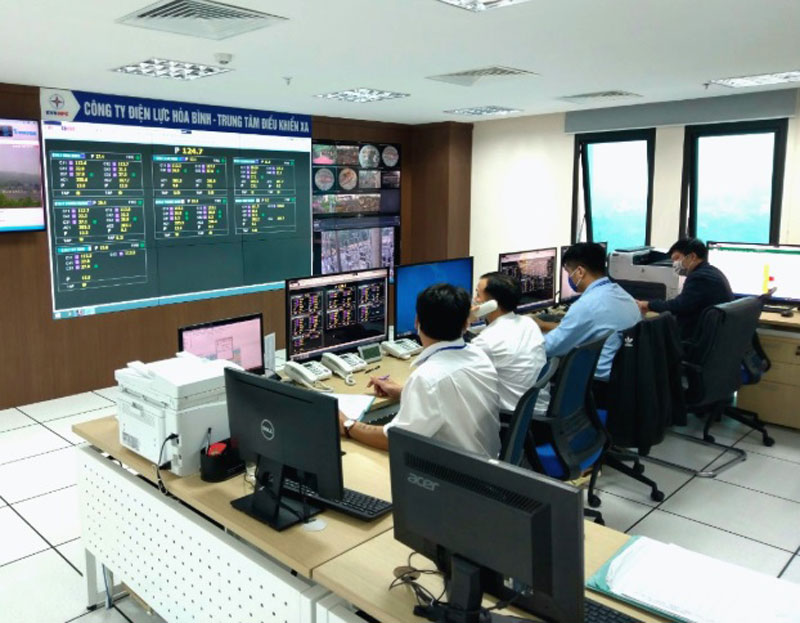
(HBO) – Amid complex developments of the Covid-19 epidemic, the Hoa Binh Power Company (PC Hoa Binh) has been quarantining 20 staff members of the remote control centre from April 1 to 15 in order to prevent any risk and ensure the continuous and stable operation of the electricity grid.

The isolation of the remote control centre
is aimed at preventing the risk of infection and cross-infection of SARS-CoV-2,
thus ensuring the stability and continuity of electricity supply in the
province.
Implementing the direction of the
Northern Power Corporation on ensuring power supply during the Covid-19
epidemic, PC Hoa Binh has put 20 staff members of the remote control centre
under quarantine.
Everyday, the company will send a
vehicle to transport the new working group from the quarantine facility to the
workplace and bring the people who have finished their shift back to the
facility. The drivers of the vehicle are also quarantined in the same facility
with the shift workers. The other staff members of the remote control centre are
quarantined at their working place - the centre’s office at the 9thfloor of Hoa Binh PC building. Internees of the centre are also required to
self-quarantine and work from home.
Before starting the quarantine
period, the centre’s staff members had their health checked. During the
quarantine duration, all staff members are required to wear face masks at the
workplace, and even don protective gear if necessary. They are also asked to
regularly gargle, wash their hands, and clean objects that they often touch.
Earlier, PC Hoa Binh donated more
than 46 million VND to Covid-19 control efforts in response to appeals. Of the
sum, the company doled out 20 million VND, while the remaining is donated by
the company’s employees through messaging./.
Hoa Binh province is undergoing a dynamic transformation amid Vietnam’s national digital transition. Building on Poliburo’s Resolution No. 57-NQ/TW on breakthroughs in science, technology, innovation, and national digital transformation, the province has rolled out a wide range of practical action plans. A standout initiative is the "Digital Literacy for All” movement, an effort to ensure that no one is left behind in the digital era.
Hoa Binh province is undergoing a dynamic transformation in the wake of the national digital transformation movement. Building on Resolution No. 57-NQ/TW of the Politburo on breakthroughs in science, technology, innovation, and national digital transformation, the province has implemented a wide range of practical action plans. A standout initiative is the "Digital Literacy for All” movement ambitious effort to ensure that no one is left behind in the digital age.
With a spirit of unity and proactive problem-solving, the Party Committee, the government and the people of Dong Lai Commune (Tan Lac District) have made great strides in implementing the resolutions of the 24th Party Congress of the commune for the 2020 - 2025 term. Focusing on leadership and practical actions, the commune has brought the Party’s resolutions into daily life, creating strong impacts and pushing the local development forward.
Amid the nationwide push for digital transformation, young people in Hoa Binh Province are stepping up as dynamic pioneers, applying technology to enhance Youth Union operations and expand the reach of youth-led initiatives. Through creativity and adaptability, Youth Union organizations at all levels have introduced a series of practical solutions, contributing to modern governance and community development.
In recent years, An Nghia commune, located in Lac Son district, has stepped up administrative reform, focusing on improving the quality and efficiency of its single-window service unit for receiving and processing administrative procedures. These improvements have helped create favourable conditions for local residents and organisations to handle administrative procedures, contributing to the commune’s broader socio-economic development.
The Prime Minister-approved master plan to develop the multi-use value of forests ecosystems through 2030, with a vision to 2050, aims to improve the management and sustainable use of forest resources, create jobs, increase incomes, and improve the living standards of ethnic minorities, people in mountainous and remote areas, forest workers and those living near forests.



